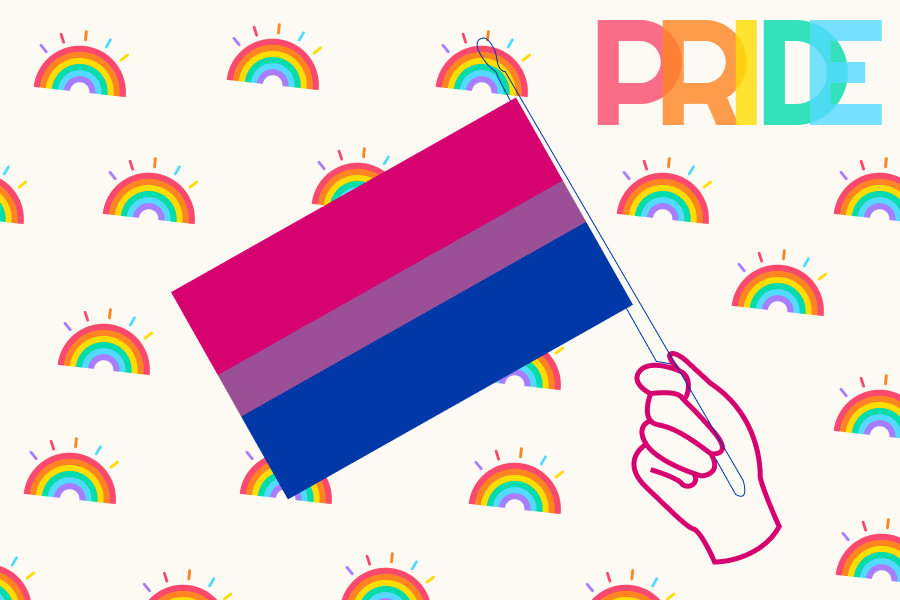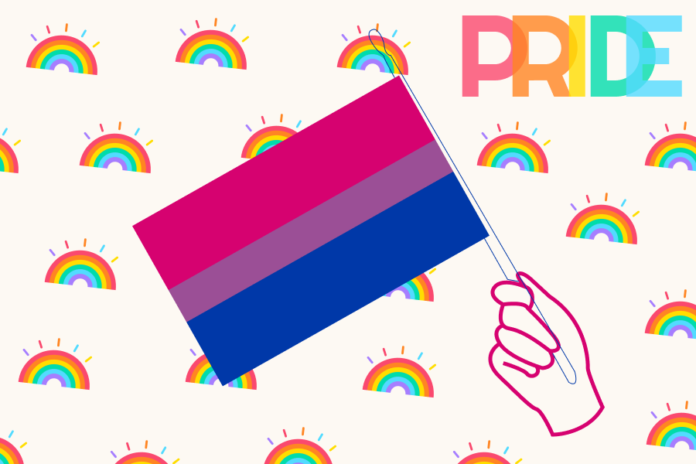
Students and professors discuss how they fee their bisexual identities have been invalidated by their peers
By ALEXANDRA BEITIA — features@theaggie.org
In 2020, a Gallup review poll reported that 3.1% of all U.S. adults self-identify as bisexual. The review also shows that it is more common for members of younger generations to identify as bisexual and that 15.9% of Generation Z (born 1997-2002) identify within the LGBTQIA+ community, which is the largest percentage of a generation to do so. However, despite larger percentages of people identifying as bisexual, it is not uncommon for individuals to face discrimination unique to their identity.
In the LGBTQ community, some say that people who identify as bisexual are frequently invalidated, including UC Davis second-year Sophie Benefiel, who said that people who identify as bisexual are often considered “not queer enough” or that bisexuality is sometimes treated as “a steppingstone to new identities.”
Kaelen Tabasa, a UC Davis fourth-year double majoring in gender, sexuality and women’s studies and political science, has a similar perspective.
“A lot of people view bisexuality as the ‘purgatory’ for sexuality, a grey area that [individuals] are bound to leave at one point or another — a phase,” Tabasa said.
Dr. Amber Muller, a visiting professor at UC Davis who teaches in the Gender, Sexuality and Women’s Studies Department, identifies as bisexual and addresses this idea from both her lived experience and an academic standpoint.
“I think that bi-erasure is sustained by similarly orthodoxic discourses on both sides,” Dr. Muller said. “From […] straight communities saying — particularly around when bisexuality or pansexuality shows up in femme folks or women — [that] it is a phase, this is for attention, etc. Similar orthodoxic narratives in gay and lesbian communities [assert that] bisexuality is somehow a steppingstone to an ‘authentic’ queer identity.”
Dr. Muller said that even in her personal life, though she has surrounded herself with supportive and caring queer friends, due to the overwhelming and heterosexuality that is embedded in society, her friends still make biphobic jokes.
“I have a lot of […] friend groups of incredibly educated, incredibly politically-oriented queer women who will still crack jokes about ‘when I finally get […] to a place of real lesbianism,’” Dr. Muller said. “There are a lot of insinuations that bisexuality for women is always the remnants of compulsive heterosexuality.”
Dr. Muller theorizes that bisexuality recieves pushback from both straight and queer communities because of discomfort some people have with living in the ambiguity of nonbinary sexual orientation.
“Bisexuality really refuses a binary identification of sexual identification, which is still fraught and threatening to the orthodoxies to either side,” Dr. Muller said. “Part of the pushback from queer communities is the fear that bisexual people’s existence somehow evacuates the potential of ‘born this way’ arguments. Part of it is strategic. [With] bi folks who find themselves in heteronormative relationships or seemly heteronormative relationships, there is a fear that somehow this is taking away from the cause.”
Thushani Gunaratne, a UC Davis third-year double majoring in gender, sexuality and women’s studies and political science, has experienced this firsthand.
“[I’ve] been in conversations where people are like, wait, but you’re dating a straight man, so I don’t think you can say that you are queer, or bi, because you pretty much have picked your side,” Gunaratne said. “I think that also erases an understanding of being bi because for me, it’s not two genders, it’s two or more genders. […] It also enforces that [one must] pick, […] instead of looking at it as a spectrum.”
Societal erasure of bisexuality is often gender-specific, according to Lucas Cannuscio, a music major at Loyola Marimount University. In his experience, representation of bisexual men is uncommon and almost nonexistent.
“[Bisexual representation] is not typically something that is present or accepted in most social groups,” Cannuscio said. “For men, especially, it seems that people typically are more comfortable if you’re hetero[sexual] or gay.”
Cannuscio said that he faced oppression during his first year at LMU from his peers before coming to terms with his sexuality.
“I faced a lot of homophobia my first year of college before I really had a chance to explore my sexuality,” Cannuscio said. “It was pretty rough at the time, but it also taught me to not accept too strongly what other people may think of me and to trust more in my gut.”
Bisexual women and femme-presenting bisexual individuals also face gender-specific discrimination. Naphtali Sebastian, a 2022 graduate of Sacramento State University, said that she has struggled to gain acceptance from straight individuals.
“For me, as a woman, I have had men tell me ‘all girls do shit with other girls’ or
‘every girl nowadays says they’re bisexual,’” Sebastian said. “With this type of narrative, it invalidates people like me. I don’t want to feel like I have to defend myself in that way, and it’s very insensitive for people to say things like that.”
Tabasa asserts that bisexual femmes also often feel sexualized by the public in many forms.
“Bisexual women are fetishized a lot by heterosexual men,” Tabasa said.
On popular dating apps such as Tinder, some bisexual individuals, including Gutaratne, put phrases in their biographical information to attempt to avoid this fetishization, like ‘no threesomes.’ Gutaratne said that it was very upsetting how frequently they are sexualized.
“I’d be rich if I was paid every time a cis-het man asked me for a threesome upon hearing that I was bisexual,” Gunaratne said.
Many other femme-presenting bisexual people share similar feelings, including UC Davis third-year Jenny Pelliconi.
“The way we get hit up for threesomes all the time is … gross,” Pelliconi said.
Bisexual people stress that bisexuality is not imagined and is not a phase or a steppingstone, it is a distinct identity — and people should think more openly about the spectrum of gender and sexual identity.
“When you do something a bit different people feel that discomfort and say, ‘no you are doing it wrong,’” Gunaratne said. “[But], there’s no wrong way to do it.”
Written by: Alexandra Beitia — features@theaggie.org








